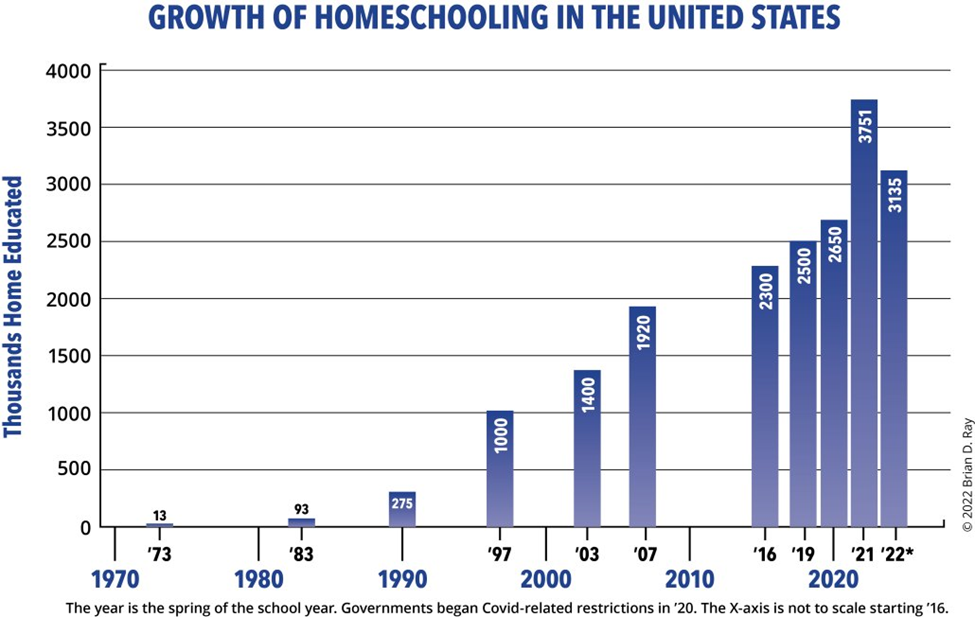You would think that the growing popularity of homeschooling in the United States would be in more news headlines. Estimates from the National Home Education Research Institute (NHERI) reveal a staggering increase in the number of homeschool students since the 1970s—by a factor of 238. Of course, there was a surge in homeschooling during the Covid lockdowns, when many public schools either went completely virtual or implemented harsh measures that severely limited both learning and student satisfaction. But the NHERI data shows that there was already a long, pre-Covid trend of growth in homeschooling, from 13,000 students in 1973 to 2.5 million in 2019. The homeschool population exploded above the trend to 3.7 million in 2021, but in 2022 it fell to 3.1 million, which is above the trend as established in the 2016-2019 school years.

Source: National Home Education Research Institute
The articles on this phenomenon in the corporate press are scant and most of them feature heaping doses of state paternalism and fear-mongering. A Washington Post article quotes a Harvard law professor: “Policymakers should think, ‘Wow — this is a lot of kids. […] We should worry about whether they’re learning anything.” The same article quotes a Florida school board member: “Many of these parents don’t have any understanding of education.”
But even the Washington Post can’t avoid mentioning what parents say about their reasons for rejecting public schools. They cite violence, exposure to explicit photos and videos on other students’ phones, and “the intrusion of politics into public education.”
The Washington Post article goes completely tone-deaf when it warns that homeschool groups “often cluster by shared ideology,” meaning that parents get to decide how their kids learn about politics and pandemics, and that it might not be the state-approved narrative. The horror!
A Vox article included a quote from the executive director of the Center for Learner Equity: “‘There’s a community-building aspect to a school,’ […] It can be a place ‘where everyone comes together to learn a common understanding of our history’ — a common understanding that could be lost if everyone homeschooled their kids.”
Almost all the articles I found said that one drawback of the popularity of homeschooling is that public schools lose out on funding. Of course, many homeschool parents, who are overwhelmingly skeptical of the institution of public education, would view that as a positive.
The Week published an article packed with tons of state paternalism: “While many parents who choose homeschooling believe they are acting in their kid’s best interest, the lack of oversight is an issue — and not an accidental one.”
And then the “experts” weigh in:
It also means that children are in danger of “not learning basic academic skills or learning about the most basic democratic values of our society or getting the kind of exposure to alternative views that enables them to exercise meaningful choice about their future lives,” said child welfare expert Elizabeth Bartholet.
We can distill the media’s view of homeschooling down to one sentence: Homeschooling is a threat because every child should learn and internalize the state-approved narratives and doctrines regarding history, politics, sex, democracy, Covid, economics, nutrition, social and emotional health, and everything else under the sun.
In Education: Free and Compulsory, Murray Rothbard eviscerated state control of education, exposing it for what it is—a program for molding children into loyal subjects:
We shall see that since the State began to control education, its evident tendency has been more and more to act in such a manner as to promote repression and hindrance of education, rather than the true development of the individual. Its tendency has been for compulsion, for enforced equality at the lowest level, for the watering down of the subject and even the abandonment of all formal teaching, for the inculcation of obedience to the State and to the “group,” rather than the development of self-independence, for the deprecation of intellectual subjects. And finally, it is the drive of the State and its minions for power that explains the “modern education” creed of “education of the whole child” and making the school a “slice of life,” where the individual plays, adjusts to the group, etc. The effect of this, as well as all the other measures, is to repress any tendency for the development of reasoning powers and individual independence; to try to usurp in various ways the “educational” function (apart from formal instruction) of the home and friends, and to try to mold the “whole child” in the desired paths. Thus, “modern education” has abandoned the school functions of formal instruction in favor of molding the total personality both to enforce equality of learning at the level of the least educable, and to usurp the general educational role of home and other influences as much as possible. Since no one will accept outright State “communization” of children, even in Communist Russia, it is obvious that State control has to be achieved more silently and subtly.
For anyone who is interested in the dignity of human life, in the progress and development of the individual in a free society, the choice between parental and State control over the children is clear.
If only Rothbard could see the explosion in popularity of homeschooling today. I think he’d also get a kick out of the pitiful media flailing about, desperate to sweep the trend under the rug while also trying to convince parents to return their children to the state’s substandard tutelage.
Full story here Are you the author? Previous post See more for Next postTags: Featured,newsletter































